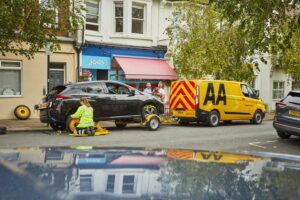Stuart Thomas, Director of Fleet and Accident Management Services at the AA
“At the AA, our business mission is to help UK drivers switch to EVs with confidence. We speak on this topic from a unique vantage point – not only are we the UK’s leading breakdown services provider, we are now also the leading provider of services to the UK’s infrastructure network. Indeed, we recently secured out 10th EV charge point support contract.
“We’re aware that many fleet managers feel obliged to plan for the 2030 deadline which will see the end of new petrol and diesel car sales. For some, it is not necessarily seen as a cause for excitement and innovation. But we believe that the future of business driving is a bright one, with exciting new technology acting as a boundary busting game-changer, changing the nature of the commute forever – a shift that can even be enjoyed by businesses wishing to focus on the positives, of which there are many.
Customer-service focused
“At the AA, we are aware that drivers need the right support when charging their vehicles, and fast, in case they come across any issues. We believe the future of business car driving is customer-centric and customer service focused. We are already constantly innovating to scale and improve our customer service offering for EV drivers. We can confidently predict that customer care will become even more focused and tailored in years to come.
“We already work in partnership with charger point operators to provide award-winning customer service support for charge post users, including an in-field ‘fix’ service. Our dedicated team of 30 call handlers, created from March 2020, handles more than 11,000 calls per month, operating on a 34/7 basis, aiding EV drivers in need of fast advice. Our team can even call on the AA’s patrol force if the issue turns out to be breakdown or vehicle related. Our phone line support provides help on the correct use of the charge point, starting and stopping a charge to perform a post reset remotely if needed, helping stuck EV drivers get back on the road with as little inconvenience to their everyday lives as possible.
Swap shop
“Range anxiety is an issue plaguing some prospective drivers, while others worry how they will charge their future EVs, given the UK’s current housing mix. But in another piece of good news for businesses, it’s highly likely that EV batteries of the future will be swappable, in a shift enabled by a switch to a battery-as-a-service (BAAS) model, new research says. The recently published report, Battery-as-a-service: An unexplored opportunity?, argues that switching to a BAAS model, allowing EV owners to exchange defunct batteries for new fully charged models at swap stations through a subscription service, could slash upfront EV costs by 30%.
“This would also provide a swift solution to the issue of charging in city environments, which prohibits many from the home charging option, while simultaneously assuaging fears of range anxiety, by swapping out a redundant battery in a matter of minutes. Such a model is already being scaled in China but has yet to be considered in the UK. The investment needed to develop and service the technology and infrastructure required is also hefty, but overall, it’s certainly an exciting proposition to bear in mind for the future.
Disability friendly
“Out of every new ten cars purchased in the UK, almost one of these is purchased by or for a disabled driver. However, historically, charge points have not proven disabled friendly – a clear barrier to purchase for this consumer group. Recent research (Urban Foresight, 2021) revealed that 61% of people would consider buying an EV only if they were made more accessible – 66% of respondents were worried about trip hazards/barriers around the car and navigating the charger.
“However, there is good news on this front too, with businesses stepping up to innovate solutions. Ford Motor Company is now trialling a robotic EV charger that less mobile drivers can activate from their phone without leaving their vehicle. Simply, the driver pulls up and activates the charger via their smartphone. This triggers the station cover to open and shoot out a robotic arm that extends to the EV inlet and connects using a tiny camera. In the past few months, the AA has called for greater EV charge point accessibility. The British Standards Institute is working with Motability and the Department for Transport to develop new accessibility standards for EV charging.
Onwards and upwards
“The AA is committed to helping drivers navigate this new landscape as demand for alternatively fuelled vehicles rises. From dedicated EV breakdown cover, supported by the largest group of EV patrols in the UK, to EV car insurance and EV driver training via Drivetech, part of the AA, our suite of services is firmly in place to help businesses as they decarbonise their fleets. The future of business driving is upon us – and we will be with you to support your transition every mile of the way.”
To find out more about AA Business Services, please visit: https://www.linkedin.com/showcase/the-aa-business-services/
To download the AA yellow paper: https://bit.ly/3gKneeo





